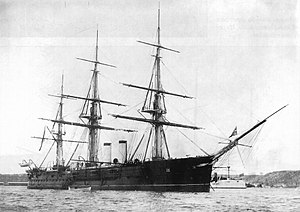Russian cruiser Gerzog Edinburgski

The Russian armoured cruiser Gerzog Edinburgski
|
|
| History | |
|---|---|
|
|
|
| Name: | Gerzog Edinburgski |
| Namesake: | Prince Alfred, Duke of Edinburgh |
| Builder: | Baltic Works |
| Laid down: | 1870 |
| Launched: | 1875 |
| Commissioned: | 1877 |
| Out of service: | 1915 |
| Renamed: | Onega |
| Fate: | Scrapped in 1949 |
| General characteristics | |
| Class and type: | General-Admiral-class armoured cruiser |
| Displacement: | 4,600 t (4,500 long tons) |
| Length: | 87 m (285 ft) |
| Beam: | 14.6 m (48 ft) |
| Draught: | 6.45 m (21.2 ft) |
| Speed: | 12.3 knots (22.8 km/h; 14.2 mph) |
| Range: | 6,000 nautical miles (11,000 km; 6,900 mi) at 10 knots (19 km/h; 12 mph) |
| Armament: |
|
| Armour: | Belt: 6 in (150 mm) |
Gerzog Edinburgski (Russian: Герцог Эдинбургский) was an armoured cruiser of the General-Admiral class built for the Imperial Russian Navy. She was the sister ship of General-Admiral and was named after Alfred, Duke of Saxe-Coburg and Gotha, Duke of Edinburgh (Gerzog Edinburgski in Russian) who married Grand Duchess Maria Alexandrovna of Russia.
The ship was originally to be named Alexander Nevski but was renamed before launch. She was launched in 1875 and served in the Far East 1879–1884 and in the Mediterranean Sea 1897–c.1900. Gerzog Edinburgski was used as a training vessel beginning in the early 1900s. She was converted to a second line minelayer in 1908. The ship could carry 600 mines and was renamed Onega. She was hulked in 1915 as a depot ship and renamed № 4, Barrikada \ «Баррикада», № 9) after the revolution. She was broken up in 1949.
...
Wikipedia
